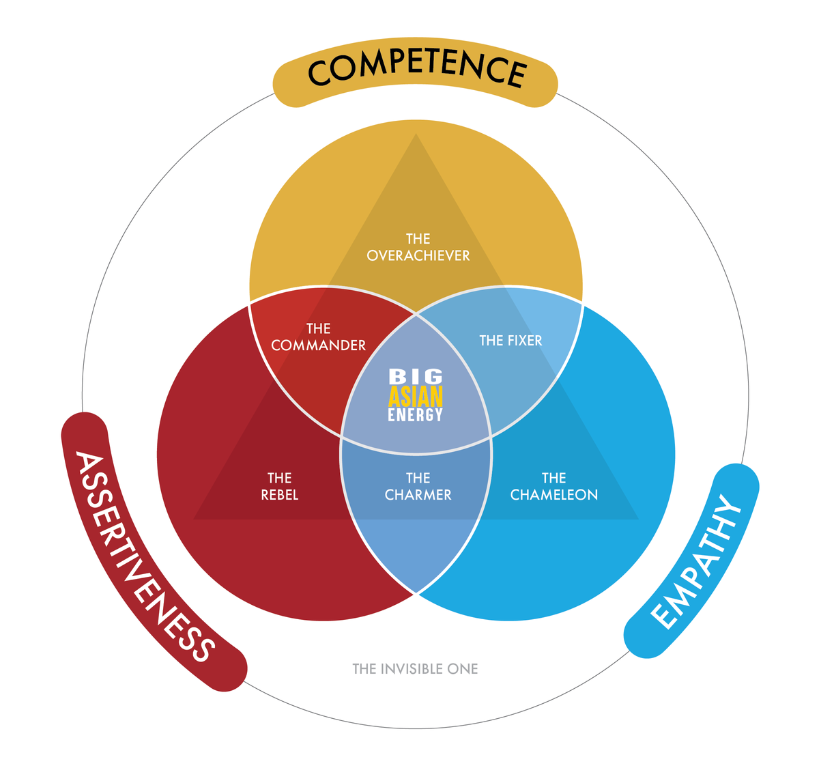58% of Americans cannot name a single prominent Asian American when asked.
STAATUS INDEX REPORT 2022, LAAUNCH.

Our mission is to help Asian Americans:
Get recognized for their Brilliance:
Many Asian Americans are taught to work hard and keep their head down, causing their efforts and talents to go unrecognized. It's time to embrace your inner brilliance, and let it be recognized.
Lead with Assertiveness.
The myth of the shy, quiet Asian American is deeply rooted in our culture's humility and politeness. Stepping into our power, drawing boundaries, and speaking assertively allow us to finally be seen for our strengths in leadership. It's time to step up and speak up!
Connect through Empathy.
Our empathy and connection are superpower, and when communicated from a position of self-mastery and self-ownership, takes us to the next level.

Have you heard statements like:
“It’s a problem, but it’s really not that bad, I don’t want to make people uncomfortable.”
“Other people have it worse, and I have pretty simple needs so it’s no big deal.”
“It’s ok, I can handle it, I just gotta work harder, I’m pretty lazy hahaha”
I often question if this is how we truly feel, or if we have been conditioned to not make waves.
When it comes to Asian North Americans, I see a group of people who have been taught to struggle alone, in the shadows. To put out their best self for “face” and “honour”, but also wonder why there’s so much unfulfillment.
But these patterns end with us.
A new generation of Asian leaders have been born.
And we're claiming our authentic voices, taking up space, and unleashing our full potential.
Why Asian Americans?
• A 2022 McKinsey Study found that in Fortune 1000 Companies, Asian Americans represent 12% of professionals and less than 5% of executives. With Asian women representing only 1.8% of C-Level positions.
• 67% of Asian Americans report being seen as "not being a good leader" at their workplace.
• Fewer than 31% of Asian Americans aged 18-54 express feelings of belonging.
• More than 58% of Americans are unable to name a prominent Asian American when asked. Of the ones named, most could only list Jackie Chan (who is not American), Bruce Lee, and Lucy Liu.
• Asian Americans are still identified as "the invisible minority" in most industries, as they are excluded from studies and seen under the "perpetual foreigner syndrome". 30% of Asian Americans recognize that their race makes it harder to feel included in promotional assessments.
Identifying Internal Limits
• For many Asians growing up, expectations of overachievement create intense pressures for perfectionism.
• It can often feel unsafe to be seen and heard, which translates to struggles to question the status quo.
• We sometimes struggle with setting boundaries with our work and become so over-identified by our work that we don't know how to ask for our needs.
• There is a cultural expectation to remain humble and not claim credit at work, resulting in the struggle of seeing others claim it in our place.
• We get patted on the back for being "book smart" or working hard, but get forgotten during promotions because we’re not “assertive” enough for leadership.
• We talk about how uncomfortable it is to even point this out, because it goes against the collectivist teachings of self-sacrifice for the team.
The 7 Archetypes of Asian American Adaptations
Are you ready to step into your Big Asian Energy?
Through interviewing dozens of experts and working with a psychologist, we've identified the 7 archetypal adaptive patterns most commonly demonstrated by Asian Americans.
Learn More About the 7 Archetypes
220,000+
Social Media Followers
15+ YEARS OF
Entrepreneurship & Mentoring
TEDX
& Keynote Speaker
JOIN THE BIG ASIAN
EMAIL LIST.
Never miss an update.




